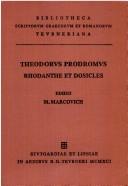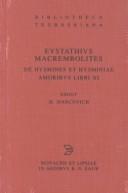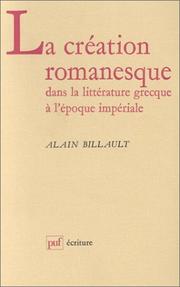| Listing 1 - 10 of 20 | << page >> |
Sort by
|

ISBN: 3815417031 3598717032 3111812960 311093700X 9783815417034 Year: 1992 Volume: vol *340 Publisher: Stuttgart : Teubner,
Abstract | Keywords | Export | Availability | Bookmark
 Loading...
Loading...Choose an application
- Reference Manager
- EndNote
- RefWorks (Direct export to RefWorks)
Romances, Byzantine. --- Byzantine romances --- Romances, Greek --- Byzantine literature
Book
ISSN: 11504129 ISBN: 9782251339498 2251339493 Year: 2007 Volume: 49 Publisher: Paris Belles Lettres
Abstract | Keywords | Export | Availability | Bookmark
 Loading...
Loading...Choose an application
- Reference Manager
- EndNote
- RefWorks (Direct export to RefWorks)
Romances, Byzantine --- Roman courtois byzantin --- Byzantine romances --- Romances, Greek --- Byzantine literature
Book
ISBN: 0521333350 9780521333351 Year: 1989 Volume: 6 Publisher: Cambridge Cambridge University press
Abstract | Keywords | Export | Availability | Bookmark
 Loading...
Loading...Choose an application
- Reference Manager
- EndNote
- RefWorks (Direct export to RefWorks)
Romances, Byzantine --- -History and criticism --- -Civilization, Medieval, in literature --- Byzantine romances --- Romances, Greek --- Byzantine literature --- History and criticism --- Civilization, Medieval, in literature. --- History and criticism. --- Civilization, Medieval, in literature --- Romances [Greek ] --- Romances, Byzantine - - History and criticism --- -Civilization, Medieval, in literature.

ISBN: 3598712324 9783598712326 Year: 2001 Publisher: Monachii Saur
Abstract | Keywords | Export | Availability | Bookmark
 Loading...
Loading...Choose an application
- Reference Manager
- EndNote
- RefWorks (Direct export to RefWorks)
Love stories, Greek --- Romances, Byzantine --- Byzantine romances --- Romances, Greek --- Byzantine literature --- Greek romance fiction --- Greek fiction --- Romances, Byzantine. --- Love stories, Greek.

ISSN: 02221179 ISBN: 2130433901 9782130433903 Year: 1991 Volume: vol *84 Publisher: Paris PUF
Abstract | Keywords | Export | Availability | Bookmark
 Loading...
Loading...Choose an application
- Reference Manager
- EndNote
- RefWorks (Direct export to RefWorks)
Fiction --- Classical Greek literature --- Greek fiction --- Narration (Rhetoric) --- Roman grec --- Narration --- History and criticism. --- History --- Histoire et critique --- Histoire --- -Greek literature --- History and criticism --- -History and criticism --- Romances [Greek ] --- Greek fiction - History and criticism.

ISBN: 0674990501 Year: 2014 Publisher: Cambridge, MA : Harvard University Press,
Abstract | Keywords | Export | Availability | Bookmark
 Loading...
Loading...Choose an application
- Reference Manager
- EndNote
- RefWorks (Direct export to RefWorks)
Leucippe and Clitophon, written in the second century CE, is exceptional among the ancient romances in being a first-person narrative: the adventures of the young couple are recounted by the hero himself. Achilles Tatius' style is notable for descriptive detail and for his engaging digressions.
Languages & Literatures --- Greek & Latin Languages & Literatures --- Love stories, Greek --- Love stories, Greek. --- Romances, Byzantine --- Byzantine romances --- Romances, Greek --- Greek romance fiction --- Byzantine literature --- Greek fiction --- Romance fiction, Greek --- Romance fiction, Greek.
Book
ISBN: 9780674996335 067499633X Year: 2009 Volume: 69 Publisher: Cambridge (Mass.) : Harvard university press,
Abstract | Keywords | Export | Availability | Bookmark
 Loading...
Loading...Choose an application
- Reference Manager
- EndNote
- RefWorks (Direct export to RefWorks)
Longus's Daphnis and Chloe (second or early third century CE), in which an idealized pastoral environment provides the setting as a boy and girl discover their sexuality, is one of the great works of world literature. Xenophon's Anthia and Habrocomes (first century CE) is perhaps the earliest extant novel.
Greek literature --- Greek literature. --- Love stories, Greek --- Romance fiction, Greek --- Languages & Literatures --- Greek & Latin Languages & Literatures --- Romances, Byzantine --- Byzantine romances --- Romances, Greek --- Greek romance fiction --- Greek fiction --- Balkan literature --- Byzantine literature --- Classical literature --- Classical philology --- Greek philology --- Histoires d'amour grecques --- Translations into English. --- Traductions anglaises --- Love stories, Greek - Translations into English --- Greek literature - Translations into English --- Romances, Byzantine.
Book
ISBN: 9789602503768 9602503769 Year: 2007 Publisher: Athēna : Morphōtiko Hidryma Ethnikēs Trapezēs,
Abstract | Keywords | Export | Availability | Bookmark
 Loading...
Loading...Choose an application
- Reference Manager
- EndNote
- RefWorks (Direct export to RefWorks)
Romances, Byzantine --- Byzantine romances --- Romances, Greek --- Libistros kai Rhodamnē --- Aphegēsis Livistrou kai Rodamnēs --- Libistros --- Libistros and Rhodamne --- Libistros et Rhodamné --- Libistros kai Rodamnē --- Livistros and Rodamne --- Livistros and Rodamni --- Livistros kai Rodamnē --- Lybistros kai Rodamnē --- Lybistros und Rhodamne --- Λιβίστροs και Ροδάμνη --- Criticism, Textual.
Book
ISBN: 3319692038 331969202X Year: 2018 Publisher: Cham : Springer International Publishing : Imprint: Palgrave Macmillan,
Abstract | Keywords | Export | Availability | Bookmark
 Loading...
Loading...Choose an application
- Reference Manager
- EndNote
- RefWorks (Direct export to RefWorks)
Byzantine Ecocriticism: Women, Nature, and Power in the Medieval Greek Romance applies literary ecocriticism to the imaginative fiction of the Greek world from the twelfth to fifteenth centuries. Through analyses of hunting, gardening, bride-stealing, and warfare, Byzantine Ecocriticism exposes the attitudes and behaviors that justified human control over women, nature, and animals; the means by which such control was exerted; and the anxieties surrounding its limits. Adam Goldwyn thus demonstrates the ways in which intersectional ecocriticism, feminism, and posthumanism can be applied to medieval texts, and illustrates how the legacies of medieval and Byzantine environmental practice and ideology continue to be relevant to contemporary ecological and environmental concerns.
Romances, Byzantine --- Women in literature. --- Nature in literature. --- History and criticism. --- Nature in poetry --- Woman (Christian theology) in literature --- Women in drama --- Women in poetry --- Byzantine romances --- Romances, Greek --- Byzantine literature --- Literature, Medieval. --- European literature. --- Europe-History-476-1492. --- Medieval Literature. --- European Literature. --- History of Medieval Europe. --- European literature --- Medieval literature --- Europe—History—476-1492. --- Europe --- Gay culture Europe --- History --- 476-1492.
Book
ISBN: 9781789622164 9781800856035 1800856032 1789622166 1800855451 Year: 2021 Publisher: Liverpool Liverpool University Press
Abstract | Keywords | Export | Availability | Bookmark
 Loading...
Loading...Choose an application
- Reference Manager
- EndNote
- RefWorks (Direct export to RefWorks)
This volume offers the first fully scholarly translation into English of the Tale of Livistros and Rodamne, a love romance written around the middle of 13th century at the imperial court of Nicaea, at the time when Constantinople was still under Latin dominion. With its approximately 4600 verses, Livistros and Rodamne is the longest and the most artfully composed of the eight surviving Byzantine love romances. It was almost certainly composed to be recited in front of an aristocratic audience by an educated poet experienced in the Greek tradition of erotic fiction, yet at the same time knowledgeable of the Medieval French and Persian romances of love and adventure. The poet has created a very modern narrative filled with attractive episodes, including the only scene of demonic incantation in Byzantine fiction. The language of the romance is of a high poetic quality, challenging the translator at every step. Finally, Livistros and Rodamne is the only Byzantine romance that consistently constructs the Latin world of chivalry as an exotic setting, a type of occidentalism aiming to tame and to incorporate the Frankish Other in the social norms of the Byzantine Self after the Fall of Constantinople to the Latins in 1204
Narration (Rhetoric) --- Rhetoric, Medieval --- Romances, Byzantine --- History --- History and criticism --- Libistros kai Rhodamnē. --- Byzantine romances --- Romances, Greek --- Byzantine literature --- Aphegēsis Livistrou kai Rodamnēs --- Libistros --- Libistros and Rhodamne --- Libistros et Rhodamné --- Libistros kai Rodamnē --- Livistros and Rodamne --- Livistros and Rodamni --- Livistros kai Rodamnē --- Lybistros kai Rodamnē --- Lybistros und Rhodamne --- Λιβίστροs και Ροδάμνη --- Rhetoric --- Discourse analysis, Narrative --- Narratees (Rhetoric)
| Listing 1 - 10 of 20 | << page >> |
Sort by
|

 Search
Search Feedback
Feedback About UniCat
About UniCat  Help
Help News
News